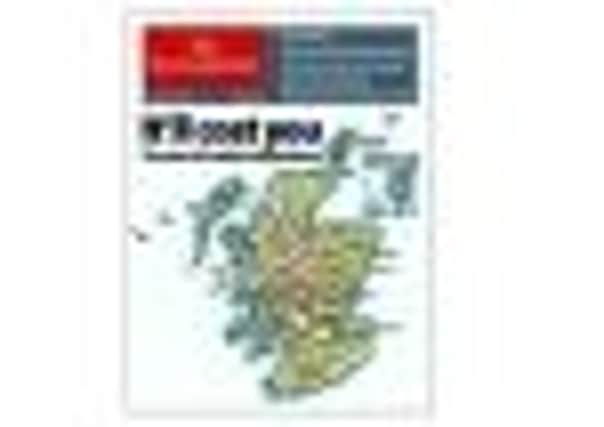Brian Monteith: SNP press outrage button but it fails to ring true


When politicians of any party hit the mock outrage button it is always a sign that their own arguments are weak and that they fear being rumbled. This general rule could be observed in its classic form over the weekend when SNP politicians huffed and puffed in defence of Scotland’s honour, ironically drawing attention to an incident that would otherwise have passed most people by.
Last week the Economist magazine made the issue of Scottish independence its lead story and had a provocative cover entitled “Skintland” that ridiculed Scotland’s economic future if it were to separate from the rest of the United Kingdom.
Advertisement
Hide AdAdvertisement
Hide AdA map of Scotland had its place names, such as Edinburgh, changed to “Edinborrow” to suggest that the the nation might end up impoverished and dependent on others. This proved too much for the SNP who, through a serious of media releases and comments via Twitter, expressed its shock and anger to the point of attacking the Economist as being part of a southern elite run by toffs.
Using words like “Bullingdon” as code for the raucous public school dining club that David Cameron, George Osborne and Boris Johnson were part of when at Oxford University, and “London”, which is a standard SNP euphemism for “English”, the nationalists ended up sounding more bigoted and partisan than the cover they objected to.
I have known many people who have worked and written for the weekly magazine and there are two things that they generally are not – little Englanders or toffs. Indeed anyone who is a regular reader would know that the journal’s editorial policy is internationalist and generally europhile in outlook and that it has always stood for a meritocratic society at the expense of self perpetuating elites. If anything it is the antithesis of a South East and London-biased oligarchy.
A close inspection of the article reveals that the arguments both for and against independence were given a balanced treatment and the nationalist and unionist case were equally challenged and repudiated.
In fact it was this balanced approach and the relatively mild analysis that Scotland could go it alone but faced serious risks that remained to be answered by the SNP that probably led to the cover being intentionally provocative. How else was a potential reader browsing the magazine racks going to be encouraged to buy a copy?
It is not as if the issue of Scottish independence is a must-read, must-buy burning issue across international news stands. While the issue of Scotland’s independence matters to many people (mostly in Scotland) they represent a small proportion of the Economist’s readership and the cover was not used outside the UK. Making prospective purchasers curious by offering humour and ridicule is a standard approach by practically all newspapers and no self-respecting politician would be without it in his or her armoury. Methinks the SNP doth protest too much – but why?
It must be increasingly clear to even the most neutral of observers that the SNP do not want to be drawn into an independence debate that requires it to give definitive answers. The strategy is to present an Elysian vision, a positive sounding future where all things can be tackled by dint of being Scottish and free from English rule.
This strategy works (and indeed has been working) so long as it is mobile and is able to move on to a new issue before the disorganised and disunited unionists have responded to the last one with reasoned argument (if they are able to articulate one).
Advertisement
Hide AdAdvertisement
Hide AdThus, when sober, unemotional and independent commentators such as relatively disinterested current affairs magazines, or internationally respected business analysts such as Citibank, produce articles and reports that ask serious questions, they have to be pounced upon by the SNP and disparaged with all the firepower that can be mustered.
The SNP strategists know that the public has a healthy cynicism towards anything said by politicians but that seemingly neutral commentators and observers will be given greater credence. Attacking the messenger, no matter how unreasonable and without foundation it might be, and ignoring the actual points that are raised, has become the standard approach.
What does the SNP say about Scotland’s dependence on oil revenues to fund all manner of economic benefits when the revenues might decline and the cost of the benefits must increase? Can all the existing benefits the SNP defends, such as tuition fees, and the new ones it proposes, such as extending childcare, be afforded when some businesses, such as banking, are in a slough of despond? Most importantly, the experience of the euro suggests that an independent Scotland using the pound sterling without any link to its fiscal policy would present real dangers.
These were all fair questions the Economist put but the SNP would rather not answer them, not because its politicians are unable to, but because it fears that in a war of attrition too many of the public are more likely to remember the questions and have doubts sown in their minds.
The SNP’s thin-skinned response suggests a weakness that the unionists are sure to exploit, firstly by repeating the questions over and over again themselves so that the doubts become lodged in the public consciousness, and secondly by exposing the SNP as unreliable and narrow-minded. Nobody likes a smart-alec; nor does anyone favour bullying, vacillation and evasiveness – all of which are visible in the SNP’s reactions.
Before the referendum there will be many more reports and articles by international journals, analysts and commentators of which some are bound to raise the same or similar questions that the SNP wishes to avoid. The Scottish public deserves answers from the SNP. To duck the tough questions shows a contempt for the public that no amount of bluster can conceal and will ultimately be condemned by defeat.
• Brian Monteith is policy director of ThinkScotland.org